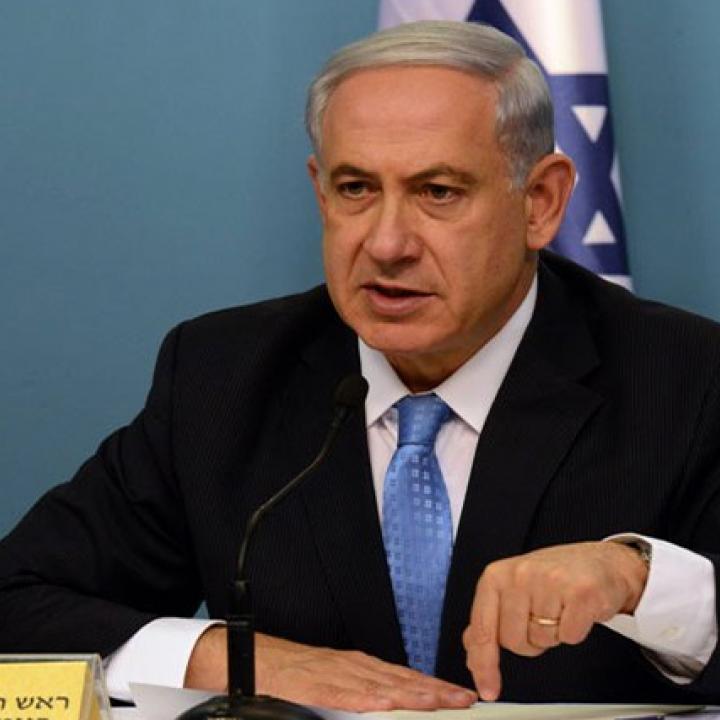
- Policy Analysis
- Policy Alert
Israel Believes Washington Did Not Maximize Its Leverage with Iran

Israel's concerns about the framework nuclear deal center on how the United States will prevent Iran from getting away with violations, increasing its destabilizing actions in the Middle East, and triggering a regional arms race, all while Tehran gets to retain much of its industrial-size nuclear infrastructure.
Given Prime Minister Binyamin Netanyahu's repeated public statements about his expectations for an Iran nuclear deal, and given that Israel considers Tehran's program an existential threat, his full-throated criticism of the just-released U.S. framework parameters is not surprising. Yesterday he declared, "Such a deal would not block Iran's path to the bomb. It would pave it." And on the eve of Passover, he convened an extraordinary session of Israel's security cabinet and stated that its members are "united in strongly opposing the proposed deal," which he argues would threaten Israel's very survival.
The crux of the Israeli critique is that the United States did not use its full leverage in the negotiations, and that Washington's objective evolved during the talks from eliminating Iran's program to merely constraining it. Sanctions brought Iran to the table, so Israel believes more concessions could have been wrung from Tehran if the international community had more determined leadership. From this perspective, time was on Washington's side, first because Iran's main source of revenue, oil, saw its price halved in the past several months, and second because the world was united against any Iranian nuclear enrichment by dint of six related UN Security Council resolutions.
More broadly, Israel believes that Iran has never made a strategic decision to disavow nuclear weapons, and that the West has moved more toward Tehran during the talks than vice versa. According to this line of thinking, Iran senses that Washington is more enamored with incentives than disincentives, and it has never believed the United States would actually attack its nuclear program. Israeli officials also believe there is a lot of wishful thinking about Iranian intentions following a deal. For example, they note that just days before the framework parameters were announced, Brig. Gen. Muhammad Naghdi of Iran's Basij militia declared that Israel's destruction is "non-negotiable," yet American media outlets largely ignored the statement.
Israel's critique is not just about the deal's terms, but also about what implications they might hold for Iran's role in the Middle East. Three concerns stand out.
First, the framework parameters seem to indicate that Iran will be able to maintain its industrial-size nuclear infrastructure by the time the agreement expires in fifteen years, including unfettered access to advanced centrifuges to create weapons-grade uranium more easily. Israelis believe that anticipation of these future Iranian capabilities will likely trigger an arms race in the Middle East to preempt Tehran, perhaps including closer nuclear cooperation between Pakistan and Saudi Arabia. Any such developments would change the regional status quo.
Second, Israeli officials fear that inspectors will not have the access they need after the deal is signed, and that verification of Iranian compliance will therefore be less robust than Washington is portraying it. They are particularly concerned about access to Iranian military sites. Israelis also worry that there is little clarity about a mechanism for determining Iranian violations and how "snapback" sanctions would be reactivated if necessary. In their view, the differing commercial interests among Security Council members would make it difficult to reapply sanctions universally, so the surest way to avoid Iranian violations in the first place is to spell out unambiguous consequences in advance.
Third, Israel is concerned that a nuclear deal will embolden Tehran to play an even more destabilizing role in the region. Iran will no longer be a pariah state following the agreement, and the lifting of sanctions will invariably increase its revenues, enabling the regime to increase assistance to Hezbollah or engage in other forms of terrorism sponsorship. Meanwhile, Israel worries that Washington will not want to confront Tehran about these regional activities for fear of upsetting the nuclear agreement, given the perceived U.S. hope that the deal will transform Iran into a more normal state. Here again, Israel believes the surest way to avert the problem is to spell out in advance how the United States will punish Iran if it chooses to further destabilize the region.
As the Iran debate unfolds in the coming weeks, Washington will have opportunities to refute Israeli allegations, and a more nuanced picture will undoubtedly emerge as a result of the point-counterpoint. Former head of Israeli military intelligence Amos Yadlin has called on Netanyahu not to oppose the agreement outright, but to seek greater clarifications from the Obama administration about a range of unresolved questions as the accord enters the drafting stage, including enforcement issues.
Other second-guessing will emerge within Israel as well. In particular, many will speculate whether the timing of Netanyahu's March 3 speech on Capitol Hill had the unintended consequence of helping President Obama consolidate his Democratic flank to better resist any congressional efforts to override the nuclear framework. Yet the main discord will be between the White House and Israel rather than inside Israel, so one can expect a great deal of turbulence ahead in the bilateral relationship.



